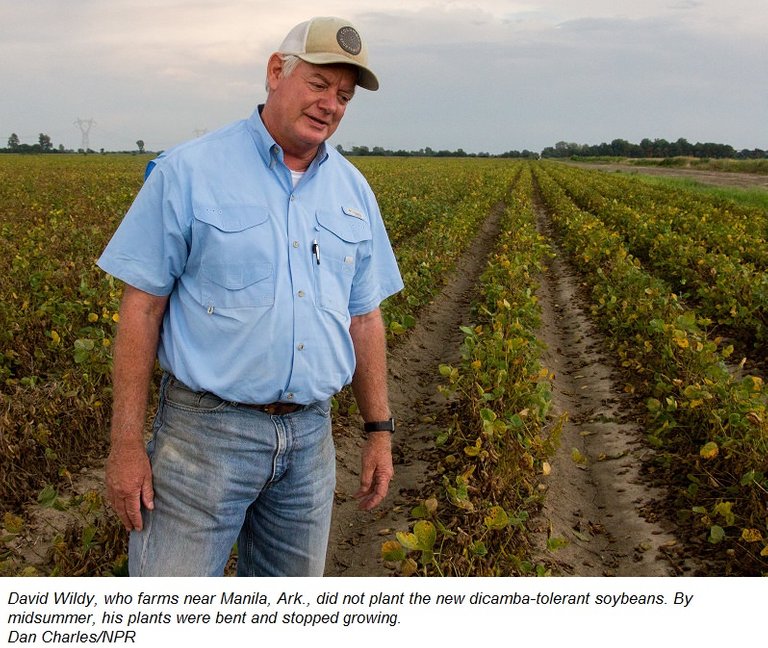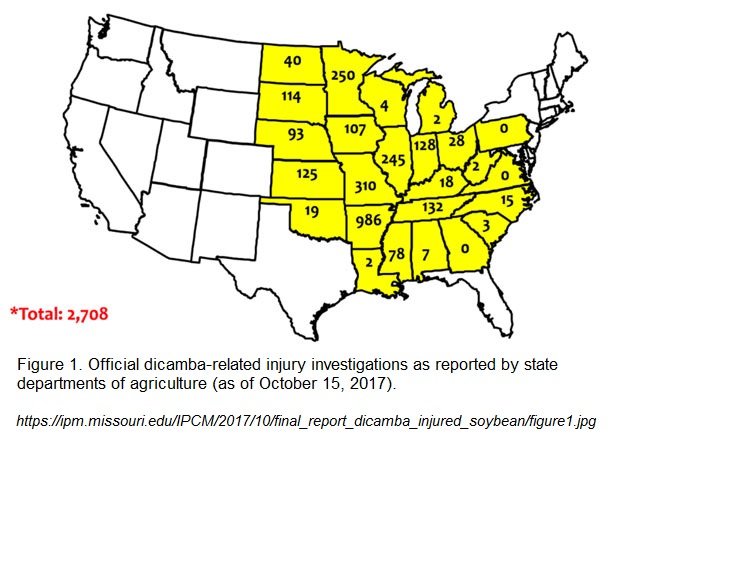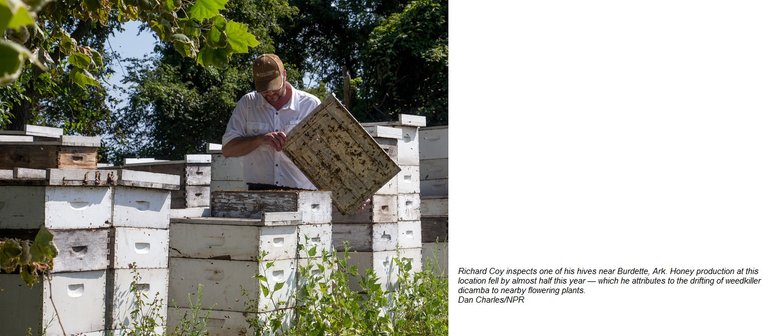
A press release from the Center for Food Safety reported last November the decision of the Arkansas Plant Board to partially ban the use of the herbicide spray dicamba which is known to damage other non target plants.
Dicamba is a herbicide that is designed to be applied to dicamba resistant strains of soybeans and cotton.
This year (2017) has seen unprecedented levels of crop injury linked to widespread planting of Monsanto’s genetically engineered (GE), dicamba-resistant soybeans and cotton, which are sprayed with new dicamba formulations developed by Monsanto and BASF.
According to Integrated Pest Management of the University of Missouri...
there are 2,708 dicamba-related injury cases currently under investigation by various state departments of agriculture around the U.S., and that there were approximately 3.6 million acres of soybean that were injured by off-site movement of dicamba at some point during 2017.

Dicamba has also injured tomatoes, watermelon, cantaloupe, grapes, pumpkins, peas, tobacco and organic vegetable crops, not to mention trees and shrubs.
The damage done by this herbicide effects commercial crops as well as other plants bordering the treated areas.
Honeybees and other insects rely on floral sources for their food and with effected plants dying or not producing flowers, their source of pollen and nectar dries up.

Honey production at his site is down by 40 percent to 50 percent, Coy says. Across the region, in areas where farmers sprayed dicamba, honey production dropped by about one-third, on average.
The long term economic and environmental impact caused by this herbicide is largely unknown but what is known is that Monsanto has a vested interest in backing dicamba. According to the comments of the CFS to the Arkansas Plant Board...
Many farmers with dicamba-injured soybeans now feel compelled to grow Xtend varieties to protect against drift damage. This means forced payment of the premium for Xtend seeds;loss of premia in the case of non-GMO or organic growers who feel compelled to switch to Xtend
Sounds like a win win for Monsanto
Engenia, XtendiMax, and Fexapan contain dicamba which is believed to volitize in warm weather injuring other crops and plants.
Monsanto is aware of the problem as the November 2017 Special Local Need Label states
the use of Xtendimax is prohibited after June 1 2018 in some areas of Missouri and July 15 2018 in the rest of the state. It is labeled for use in 33 states for 2018. See Xtendimax Label
So not only do beekeepers face losses from varroa mites, neonictinoids and other pesticides, now the added burden of loss of forage sites for the bees diminishes the production of honey making it more difficult for beekeeper to keep bees in effected areas.
The ecosystem is taxed with the loss of pollinators that gather pollen and nectar further stressing the injured plants that depend on them.
It seems the short term profit motive (relatively speaking) could have long term consequences on the environment as yet to be seen.
Original articles:
CFS DEFENDS ARKANSAS FROM MONSANTO LAWSUIT
Update on Dicamba-related Injury Investigations and Estimates of Injured Soybean Acreage
A Wayward Weedkiller Divides Farm Communities, Harms Wildlife
Congratulations @frankswi! You have completed some achievement on Steemit and have been rewarded with new badge(s) :
Click on any badge to view your own Board of Honor on SteemitBoard.
For more information about SteemitBoard, click here
If you no longer want to receive notifications, reply to this comment with the word
STOPCongratulations @frankswi! You have completed some achievement on Steemit and have been rewarded with new badge(s) :
Click on any badge to view your own Board of Honor on SteemitBoard.
For more information about SteemitBoard, click here
If you no longer want to receive notifications, reply to this comment with the word
STOP